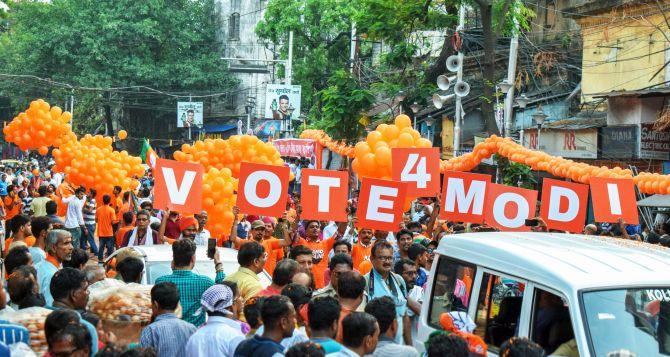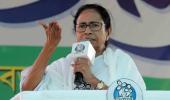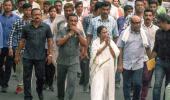The desecration of Vidyasagar's statue during Amit Anilchandra Shah's rally, which the TMC projected to be a 'Bhojpuri' and 'Dhokla' invasion on West Bengal's culture, may help her gain some favour with middle-class and erudite Bengalis in the last phase of the polls.
Avishek Rakshit reports from Kolkata.

For the first time in the history of independent India, West Bengal is expected to have voted largely on religious lines in the past six phases of the ongoing general election and may maintain the same stance for the final phase of elections slated on Sunday.
The alleged discontent with state Chief Minister Mamata Banerjee's appeasement policies towards the minorities, especially Muslims, is believed to have played a part.
Runa Sen, a homemaker from one of the older affluent families from Kolkata North notes that even at a time when Kolkata (then Calcutta) witnessed the 'Week of the Long Knives' when the country was partitioned in the name of religion, the city and the state at large didn't vote on religious lines in the election of 1952.
"Elections used to be on the lines of development, policies and ideologies between a moderate Congress and the Communist-Socialist Left Front. But times have changed now. It's come to a point when Muslim immigration from Bangladesh has become a core issue and how political leaders are giving ground to Muslims, particularly from Bangladesh, for votes," Sen notes.
In its quest to bag seats, the Trinamool Congress roped in popular Bangladeshi actor Ferdous Ahmed, who is popular in rural Muslim dominated belts of West Bengal, to seek votes in Raiganj, a Muslim dominated constituency.
Yet again, the party repeated the same instance by bringing in Ghazi Abdul Noor, another Bangladeshi actor, who attended a political rally in Dum Dum. Both were told by the Centre to leave India.
Such instances haven't been taken lightly by a majority of traditional Bengali Hindu families of North Kolkata.
During a poll campaign in Kalimpong, when BJP President Amit Anilchandra Shah vowed to oust illegal Muslim immigrants from this state while giving citizenship to Hindu and Buddhist migrants, the attendees had cheered with joy and the ripples of appreciation were also felt in the metropolis.
Political observers like Biswanath Chakraborty note that the BJP has been successful in this state to polarise the population, and in the last couple of years, there has been quite a few religious riots across the state.
He notes that to gain political favour with the Muslims, who account for 28 per cent of the state's population, Mamata, in the past, offered several dollops to the community like setting up Haj houses for pilgrims and a new campus for Aliah University besides sanctioning around 400 madrasa hostels and scholarships for Muslim students.
But the most controversial move, which angered a large section of Hindus and projected the BJP as their saviour, was the Imam and Muezzin allowance of Rs 2,500 and Rs 1,500, respectively, which the chief minister proposed in April 2012.
Although it was struck down by the Calcutta high court after the then BJP state general secretary Asim Sarkar challenged it, Mamata maintained she will provide all assistance to the Muslims.
For a debt-ridden state like West Bengal, this allowance is estimated to have potentially led to an outflow of Rs 126 crore annually.
"This hadn't gone well with the Hindus who asked why Hindu priests were denied such allowance and if at all, in a secular country like India, this was feasible. Polarisation actually started gaining momentum since then and not just now as it is being projected. Under all circumstances, polarisation is a reality now in this otherwise pseudo-secular state," Chakraborty said.
Moreover, Mamata's recital of Islamic verses and her association with Muslim festivals like Eid were also frowned upon from a section of orthodox Hindus.
A Bihari migrant driver, Tarakeshwar Shaw, who is a voter in the Kolkata North constituency asked, "How can the chief minister, herself being a Brahmin, recite Islamic verses or associate herself closely with Muslims?"
On the other hand, the TMC as well as Mamata herself have been vehemently projecting the chief minister as a devotee of goddess Kali -- one of the most popular Hindu deities in West Bengal.
While a majority of Muslims, via various rights and religious forums, pledged their support for Mamata, Shaw, and many other Bengali and non-Bengali Hindus of limited financial means, openly admit their support for the BJP.
Shaw claimed that during the erstwhile Left Front rule, state policies and schemes weren't directed at appeasing any particular religion.
Meanwhile, as discontent grew, the BJP gained momentum in the state.
During the 2014 general election, the BJP had a 17 per cent vote share which was an 11.86 per cent increase as compared to the 2009 general election, while in the 2016 assembly elections it won three seats with a vote share to 10.16 per cent.
Furthermore, in the 2018 panchayat polls, it won 5,779 seats thereby becoming the main Opposition party in West Bengal. BJP state Vice-President Chandra Kumar Bose, who is contesting from the Kolkata South constituency, believes that in this year’s polls, the party's vote share will increase to 38 to 40 per cent.
He is of the opinion that the TMC or other parties like the Left Front and the Congress will get the Muslim votes in the state. But in case the BJP bags at least 65 per cent of the Hindu's votes, it can easily get a satisfactory number of seats.
According to Bose, the BJP is growing its presence among the Bengali Hindus, which account for 48 per cent of the total vote base from the state and the party is okay with fighting this election without Muslim support.
Bose pointed out how anger and frustration of Hindus prompted Mamata to recite Sanskrit shlokas, Chandi Paath and other Hindu religious verses during her poll campaign. She has also been harping about her government's work done in temple restoration and new projects; which otherwise was previously missing.
"In the 2017 Durga Puja, her order of restricting idol immersion during the Muharram celebration was struck down by the Calcutta high court. This was a setback for her," Bose added.
State BJP president Dilip Ghosh had then alleged that besides curbing religious rights during Bengali Hindu festivals, Mamata was also attempting introduction of Urdu-Arabic words in the Bengali language.
On the other hand, a few years back, she had started the Durga Puja carnival, where idols and other works of art related to that festival were showcased and paraded.
Besides, Mamata had given Rs 10,000 to every club last year as monetary support for Durga Puja.
Nevertheless, the alleged desecration of Vidyasagar's statue during Amit Anilchandra Shah's rally, which the TMC projected to be a 'Bhojpuri' and 'Dhokla' invasion on West Bengal's culture, may help her gain some favour with the middle-class and erudite Bengalis in the last phase of the polls.
But as Chakraborty cautions, it may have been too late for her to appease a section of Bengali Hindus who now view the BJP as their saviour.











